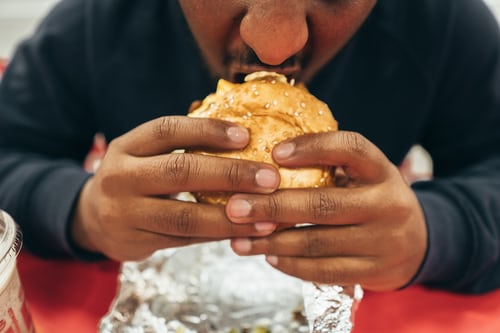




Eating Disorder
Eating disorders are characterized by abnormalities in the pattern of eating and the amount and nature of food eaten. These behaviours are determined primarily by the patients’ attitudes to their weight and shape. The disorders share distinctive core psychopathology, which is best described as an overvaluation of weight and shape, such that patients judge their self- worth in terms of their shape and weight and their ability to control these. The disorders covered in this are anorexia nervosa and bulimia nervosa, as well as several other related conditions. Obesity is not covered, as it is not a psychiatric disorder.
The condition usually begins in adolescence and young women. It generally begins with ordinary efforts at dieting, which then get out of control. The central psychological features are characteristic thinking about body shape and weight. They have an undue influence of body weight or shape on self- evaluation.
How to recognize the illness?
Anorexia Nervosa
- Very low body weight (defined as being 15% below the standard weight, or body mass index (BMI) of less than 17.5 kg/ m2), which is maintained by restriction of energy intake.
- Extreme concern about weight and shape, characterized by an intense fear of gaining weight and becoming fat and a strong desire to be thin.
- Lack of recognition of the seriousness of low body weight.
- Amenorrhea at least 3 months.
Other psychological symptoms include depression, anxiety, obsession symptoms, the liability of mood, social withdrawal, and lack of sexual interest.
Other Physical symptoms are:
- Poor sleep, with early- morning wakening
- Emaciation, Weak proximal muscles (e.g. difficulty in rising from a squatting position), Stunted growth and failure of breast development (if onset is prepubertal)
- Dry skin, especially in palms and soles, Fine downy hair on the back, forearms, and sides of the face
- Salivary gland swelling
- Erosion of the inner surface of the front teeth in those who vomit frequently
- Bradycardia; hypotension; cardiac arrhythmias due to electrolyte, abnormalities, Dizziness, and syncope
- Heightened sensitivity to cold, cold hands and feet; hypothermia
- Gastrointestinal symptoms— constipation, fullness after eating, bloating
- Peripheral oedema
Bulimia Nervosa:
- A preoccupation with eating, with an irresistible and recurrent urge to overeat, manifesting in repeated ‘binges’ when large amounts of food are consumed in a short time, accompanied by a sense of loss of control.
- The use of extreme measures to control body weight, especially self- induced vomiting and use of laxatives, as well as periods of starvation or excessive exercise.
- Overvalued ideas concerning shape and weight, of the type seen in anorexia nervosa.
- These behaviours should have occurred at least once a week for 3 months, and that they do not occur solely during times when the person met criteria for anorexia nervosa.
- Cardiac arrhythmias, cardiomyopathy, Gastric problems, Myopathy, Damage to teeth, Parotid gland enlargement and raised, salivary amylase, metabolic alkalosis, Peripheral oedema are also seen.
Patients with bulimia nervosa are usually of normal weight (BMI 18.5– 25). They have a profound loss of control overeating. Episodes of binge eating may be precipitated by stress, or by the breaking of self- imposed dietary rules, or may occasionally be planned. During the episodes, large amounts of food are rapidly consumed, on average over 2000 kcal.
This voracious eating usually takes place when the patient is alone. At first, it brings relief from tension, but this is soon followed by guilt and disgust, and the patient induces vomiting or engages in another compensatory behaviour.
Treatment:
- Assessment is a vital part of treatment: Most patients with anorexia nervosa are reluctant to change their behaviour. So, it is very important to establish a good relationship with a therapist. This means listening to the patient’s views, explaining the treatment alternatives, and being willing to consider compromises. A detailed history should be taken of the development of the disorder, psychopathology of anorexia nervosa or bulimia, the present pattern of eating and weight control, and the patient’s ideas about body weight. It is also important to perform a full physical examination, measurement of weight and BMI, cardiovascular status (blood pressure, heart rate), and temperature, routine investigations include full blood count, urea and electrolytes, blood glucose, liver function tests, and ECG.
Both, Psychotherapy and Pharmacotherapy interventions are needed for effective management. It’s not only psychopathology but the physical illness should be taken care.
- Psychotherapy: Psychotherapies are the mainstay of treatment for an eating disorder. Earlier this was based on Psychodynamic concepts, now cognitive behaviour therapy (CBT) and related therapies became a modern treatment. Both family and individual interventions required for behaviour therapy, reflecting the belief that family factors are important in the origins of anorexia nervosa. Various kinds of family therapy have been used.
- Pharmacotherapy: Related depressive symptoms, anxiety, OCD, sleep disorder, and personality disorder are treated with antidepressants and anti-anxiety medicines.
Weight restoration, hormonal therapy, electrolyte management, is important for physical wellbeing.
How Udgam will help?
People always try hard to get out of this. They try their best to keep them illness free, but sometimes fail to rectify issues? Team UDAGM, the clinical psychologist expert in counselling, will be your real friend and will help to manage your problems diligently.

